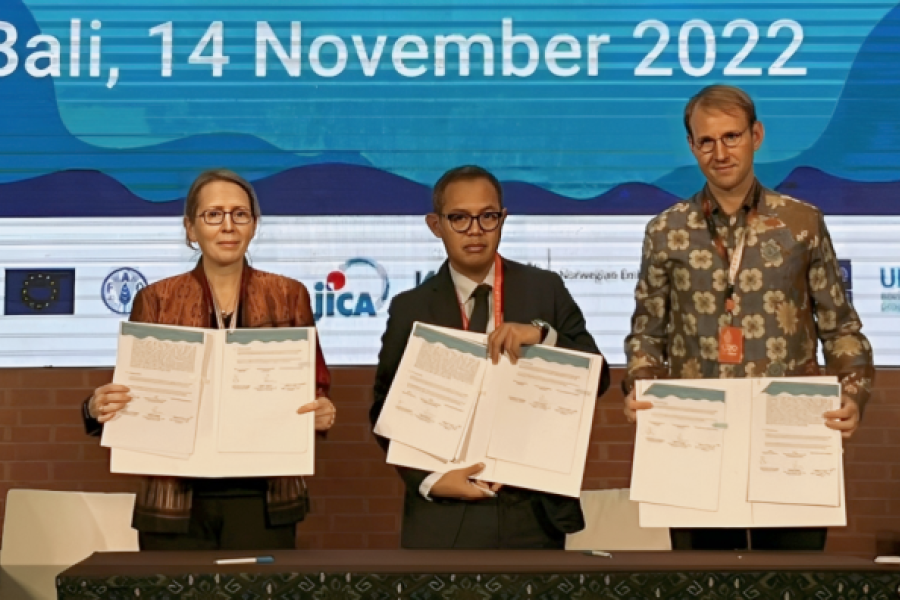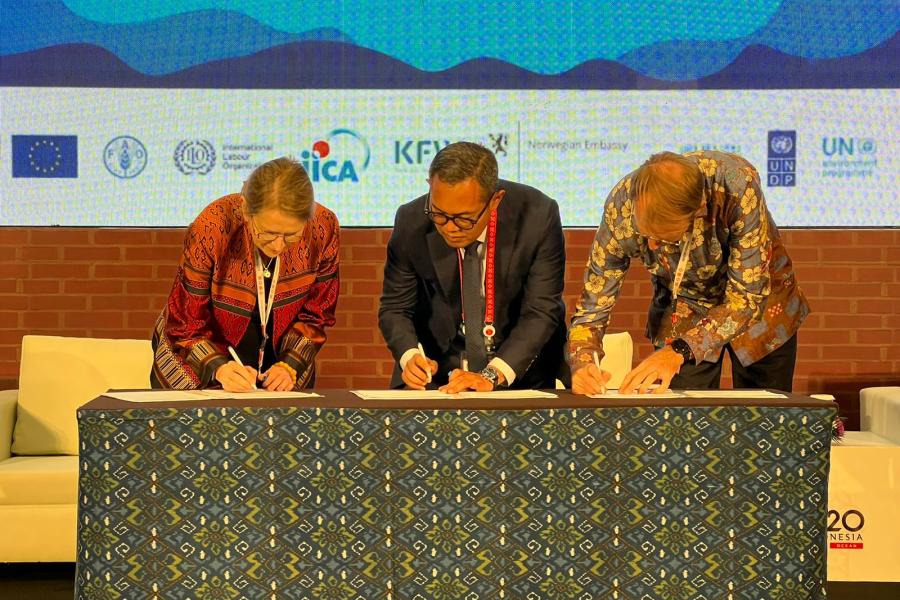United Nations in Indonesia and Government of Indonesia Launch National Blue Agenda Actions Partnership for Sustainable Ocean Development
14 November 2022
---

Nusa Dua, November 14, 2022 - Indonesia has moved a step further in achieving the 2030 Sustainable Development Agenda with the signing of the Blue Agenda Action Partnership in Nusa Dua, Bali, today. Under this comprehensive partnership, eight UN agencies and several other international development partners will support the Government of Indonesia in sustainable ocean development. The partnership was officially signed on the sidelines of the 17th G20 Leaders' Summit.
The Coordinating Minister for Maritime Affairs and Investment of the Republic of Indonesia, Luhut B. Pandjaitan, stated that building a sustainable blue economy is very important for Indonesia as it can help increase revenue from marine and fisheries activities, as well as preserve marine biodiversity and maintain ocean health conditions through the restoration and protection of marine ecosystems, and the sustainable use of marine resources. "The launch of this partnership provides an opportunity for Indonesia to take concrete actions and collaborate to bring social, economic and environmental change in the maritime sector," he said at the Blue Agenda launch event. "This partnership will help us recover faster, emerge stronger, with a focus on the interests of future generations."
UN Representative in Indonesia, Valerie Julliand, highlighted the complementarity between partners in achieving the common goal of sustainable ocean economic development. "The UN agencies and development partners participating in this partnership share experiences, expertise and innovative approaches, and deliver projects that support the Government of Indonesia in accelerating the Blue Agenda," she said.
The world at large is only now realizing how badly the ocean has deteriorated due to overexploitation of marine resources and increased dumping of waste into the high seas. The UN Oceans 2022 Conference in Lisbon earlier this year highlighted the plight of our oceans with countries expected to commit to the protection and sustainable use of marine resources. This focus will also take center stage at the UN Biodiversity Conference in Montreal in December.
Indonesia, as the world's largest archipelago, is setting an example with its balanced, long-term approach to ocean development, said Peter Thomson, the UN Secretary-General's Special Envoy for Oceans. "The world is watching, and together we can make a difference!"

The partnership will focus on the ocean and maritime sectors, ensuring a healthy environment and contributing to prosperity under four pillars: blue health, blue food, blue innovation and blue finance.
Here is how eight UN organizations will contribute to the Blue Agenda partnership.
FAO, the UN agency specialized in food and agriculture, will work with various stakeholders to support sustainable management of fisheries and aquaculture to enrich marine resources and habitat health.
ILO, the UN's global employment agency, will support the government in the development of programs that provide maritime industry workers with labor protections as well as the necessary skills in maritime sectors such as shipbuilding, international logistics and shipping.
UNDP, the UN's global development agency, stands ready to assist by ensuring the investment needs for the Blue Agenda are met by supporting the government in the development of a Blue Financing Strategy as well as a Blue Bond/Sukuk portfolio to fund marine-related initiatives.
UNEP, the UN's lead environmental agency, will work with the Government of Indonesia on the development of a Master Plan for the Blue Economy, and will also support efforts to tackle marine pollution, with a focus on land- and ocean-based natural resources, monitoring and enabling conditions for all life.
UNESCO's Intergovernmental Oceanographic Commission, the UN agency for education, science and culture, will support scientific research, data collection and capacity building to help experts understand the risks and potential of the ocean. This will also contribute to improving tsunami preparedness at the community level, minimizing impacts and building community resilience to disasters.
UN Women, the UN agency working to achieve gender equality, will partner with companies working with women in coastal areas to promote economic empowerment and support skills development through the application of the Women's Empowerment Principles.
UNIDO, a UN agency focused on improving industrialization processes, will support thousands of small and medium-sized fisheries and marine enterprises to meet quality requirements and international standards, including implementing sustainability principles. This will improve local companies' access to global markets and increase revenues.
UNOPS, a UN agency focused on infrastructure and procurement, works to combat plastic pollution by supporting ASEAN member states in developing and strengthening policies and regulatory frameworks that reduce plastic production and consumption, increase recycling rates, and minimize leakage of waste from landfills.
With the cooperation partners signed, the parties concerned will move quickly to the implementation phase, said Jamshed M. Kazi, UN Women Representative for Indonesia.
"This form of cooperation is completely 'made in Indonesia' by actors who are very active in their respective fields in sustainable ocean development. This ensures that the ideas discussed can be turned into action as soon as possible."



